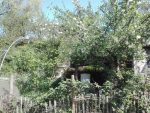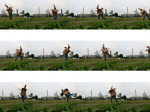Not far from the Zenne Garden a wasteland area expands along the canal. It is one of those areas looking empty, lost and not taken care of. BXL WILD LIFE and BUITEN/DEHORS is a collective of research and experimentation which proposes to consider the urban as the natural environment of man. Since 2012 the collective focuses on the relationships between maintenance, property, and inhabitation of areas. This year BUITEN / DEHORS decided to start on a piece of land located between Digue du Canal and rue des Goujons in Anderlecht, the establishment of what is called an adventure playground*.
This project is part of a broader research questioning the place of children in the city, the practice of an anti-authoritarian education, the citizen's auto-construction of the city, radical ecology as a reconsideration of the relation between man and his environment. As so it can be seen as an outcome as well as the beginning of something unexpected.
The adventure field is as much about the physical structure that we try to put in place as its context.
The land, located in an area of current "urban renewal" belongs to a private developer, Atenor, lurking for the right moment for exploitation. Officially considered as a wasteland, it is one of those areas looking empty, lost and not taken care for. Its current inhabitants are most invisible, the soil polluted and the (non-)maintenance very diverse. BUITEN/DEHORS is occupying it with no authorization.
The structure is made of second-hand wood, thrown by people in the street, collected daily in the surrounding neighborhood, Cure-ghem. Like our knowledge of the site, it is gradually built up according to our weekly onsite visits. It is built and destroyed, with no preconceived plans, by us and the children passing by. An ongoing process, to be continued in many different ways.
*The first junk playgrounds were based on the ideas of Carl Theodor Sørensen, a Danish landscape architect, who noticed that children preferred to play everywhere but in the playgrounds that he designed. In 1931, inspired by the sight of children playing in a construction site, he imagined "A junk playground in which children could create and shape, dream and imagine a reality". He aimed to provide children living in cities the same opportunities for play that were enjoyed by children living in rural areas. The first adventure playground was set up by a Workers Cooperative Housing Association in Emdrup, Denmark, during the German occupation of the 1940s. The playground at Emdrup grew out of the spirit of resistance to Nazi occupation and parents' fears that "their children's play might be mistaken for acts of sabotage by soldiers". Source wikipedia -adventure playground, 12/04/2019



